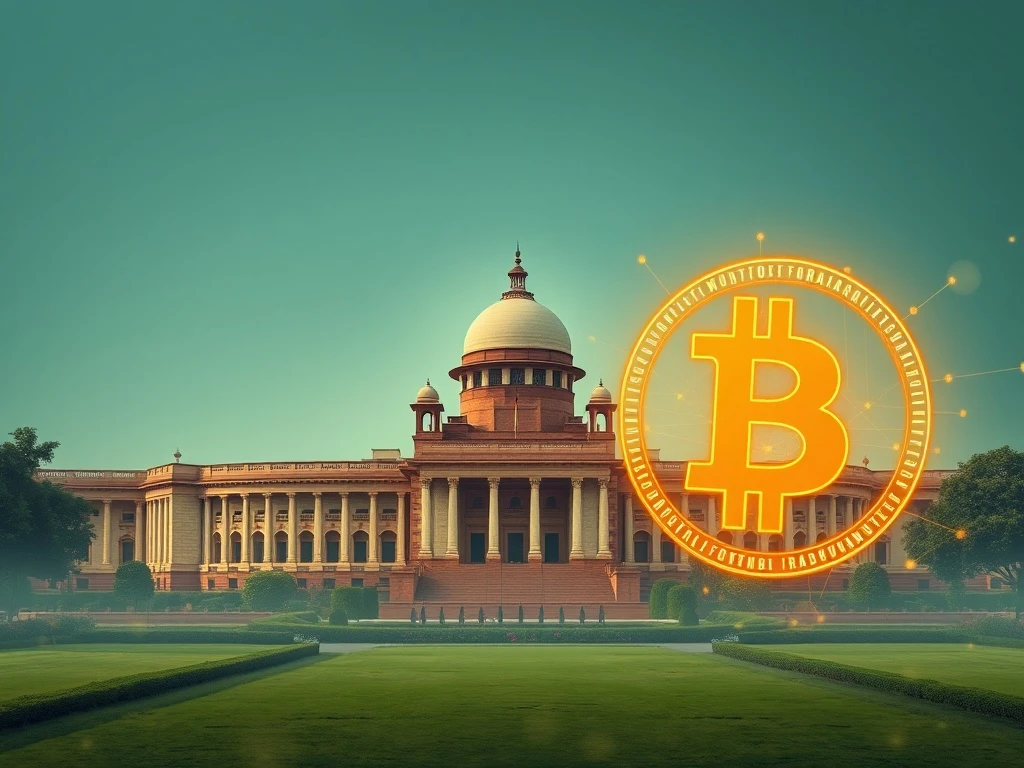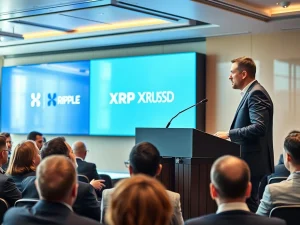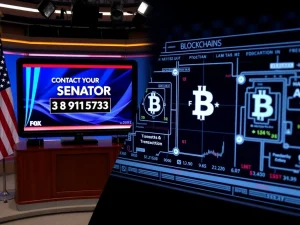Strategic Bitcoin Reserve: India’s Crucial Policy Shift for Digital Assets?

Are you tracking the evolving landscape of global finance and the surging influence of cryptocurrencies? A significant development from India is poised to capture your attention: a prominent Indian politician has called for a Bitcoin Reserve pilot. This bold proposition comes at a time when major global economies are increasingly acknowledging the strategic importance of digital assets. It signals a potentially transformative moment for India’s India Crypto Policy, urging the nation to reassess its current ‘taxed but unregulated’ approach to digital currencies and embrace a more defined stance.
Why a Bitcoin Reserve Pilot Now? Unpacking India’s Strategic Ambition
The call for a Bitcoin reserve pilot isn’t just a fleeting idea; it’s a strategic move proposed by Pradeep Bhandari, a national spokesperson for India’s ruling Bharatiya Janata Party (BJP). In an insightful article for India Today, Bhandari highlighted that nations like the United States are already exploring strategic Bitcoin (BTC) reserves, and even smaller countries like Bhutan are actively engaging in state-led mining operations. These global movements underscore a fundamental shift in how countries perceive and integrate digital assets into their economic frameworks.
Bhandari argues that India, with its burgeoning renewable energy infrastructure, is uniquely positioned to forge a sovereign Bitcoin strategy. This isn’t about reckless speculation but a calculated step towards recognizing the legitimacy and potential of digital assets. The emphasis is on building economic resilience and projecting modernity on the global stage.
Consider these compelling reasons driving the conversation:
- Global Precedent: The US’s exploration of BTC reserves and Bhutan’s state-led mining operations serve as tangible examples of nations integrating Bitcoin into their financial strategies.
- Economic Resilience: A sovereign Bitcoin reserve could act as a hedge against traditional economic volatilities and diversify national assets.
- Technological Leadership: Embracing Bitcoin strategically can position India as a forward-thinking nation in the rapidly evolving digital economy.
- Leveraging Infrastructure: India’s expanding renewable energy capacity offers a sustainable foundation for potential state-led mining or reserve management.
The Paradox: India’s Cryptocurrency Regulation Conundrum
One of the most perplexing aspects of India’s current crypto landscape is its ‘taxed but unregulated’ status. While the government has yet to establish a comprehensive regulatory framework for digital currencies, it has imposed a significant 30% flat-rate tax on Virtual Digital Assets (VDAs) like Bitcoin and Ether (ETH). This means that profits from selling crypto are heavily taxed under Section 115BBH of the Income Tax Act, with no provisions for deducting other expenses or losses beyond purchase costs. Furthermore, a 1% Tax Deducted at Source (TDS) applies to all crypto transactions exceeding $115, impacting either the buyer or seller.
This regulatory limbo creates significant challenges for the burgeoning crypto industry and individual investors alike. Without clear guidelines, businesses struggle with compliance, innovation can be stifled, and investor protection remains ambiguous. Bhandari points out this inconsistency, emphasizing the urgent need for clarity to foster a healthy and transparent ecosystem for Cryptocurrency Regulation in India.
Key Aspects of India’s Current Crypto Tax Policy:
| Policy Aspect | Details | Implication |
|---|---|---|
| Tax Rate on VDAs | 30% flat rate on profits from sale (e.g., BTC, ETH) | High taxation, potentially discouraging trading. |
| Expense Deductions | Only purchase costs can be deducted; no other expenses or losses. | Limits profitability for traders and businesses. |
| Tax Deducted at Source (TDS) | 1% on transactions above $115 (approx. INR 10,000) | Adds friction to transactions, impacts liquidity. |
| Regulatory Framework | Currently unregulated; no comprehensive laws. | Creates uncertainty for businesses and investors, hinders innovation. |
Beyond the G20: Why India Cannot Afford to Wait for Global Consensus on Digital Assets India
During its G20 presidency in 2023, India played a crucial role in coordinating a crypto working group with the International Monetary Fund. While this was a commendable step towards global consensus, Bhandari highlights that other nations are not waiting idly for recommendations to take their due course. Jurisdictions like Russia, China, Brazil, and G20 nations led by the US are actively pursuing their crypto efforts, indicating a clear race towards establishing dominance in the digital asset space.
The US government’s plans to expand its BTC reserves through budget-neutral purchases, coupled with three US states already authorizing Bitcoin as a reserve asset, underscore a pragmatic shift. This proactive approach by other nations emphasizes that waiting for a unified global framework might mean missing out on significant economic and technological opportunities. For Digital Assets India to thrive, a proactive and clear policy is essential.
The Path Forward: Regulatory Clarity and Innovation through a Bitcoin Reserve Pilot
Bhandari’s vision for India’s path forward is clear: it must include robust regulatory clarity, beginning with a sovereign BTC reserve initiative. Clear regulation, he argues, would bring much-needed transparency and oversight to this emerging asset class. This clarity is not just about compliance; it’s about enabling innovation while simultaneously protecting investors from risks inherent in an unregulated market.
A measured Bitcoin strategy, perhaps starting with a reserve pilot, could be the catalyst India needs to strengthen its economic resilience and project an image of modernity and foresight. This approach could unlock several benefits:
- Investor Protection: Clear regulations can establish frameworks for consumer protection, reducing scams and illicit activities.
- Fostering Innovation: A well-defined regulatory environment encourages legitimate businesses to build and innovate within the crypto space.
- Attracting Investment: Certainty in policy attracts both domestic and international investment into India’s digital asset ecosystem.
- Global Leadership: By taking a proactive stance, India can emerge as a leader in responsible digital asset integration, rather than just a follower.
The Broader Picture: India’s Role in Global Bitcoin Adoption
The debate in India reflects a much larger global narrative around Global Bitcoin Adoption. As Bitcoin matures and gains institutional acceptance, its role is expanding beyond just a speculative asset to a potential reserve asset for nations. India, with its massive population, technological prowess, and growing economy, stands at a pivotal juncture. Its decision on how to approach Bitcoin and other digital assets will have significant ramifications, not just for its own economy but for the broader global financial landscape.
The discussions initiated by figures like Pradeep Bhandari are crucial in moving the needle from ambiguity to clarity. They highlight the growing recognition among policymakers that ignoring digital assets is no longer an option. Instead, strategic engagement, thoughtful regulation, and perhaps even a pioneering approach to Bitcoin reserves could define India’s economic trajectory for decades to come.
Conclusion: A Bold Step Towards India’s Digital Future
The call for a Bitcoin reserve pilot from a prominent Indian politician marks a significant turning point in the country’s ongoing debate about cryptocurrencies. It underscores a growing awareness within government circles that digital assets, particularly Bitcoin, are no longer fringe elements but crucial components of the future global financial architecture. India’s unique position, coupled with the imperative for clear regulation, makes this moment truly pivotal.
As the world watches, India has an unprecedented opportunity to move beyond its ‘taxed but unregulated’ status and embrace a comprehensive, forward-looking India Crypto Policy. A strategic Bitcoin Reserve initiative could be the catalyst, not only strengthening its economic resilience but also cementing its place as a leader in the evolving digital economy. The time for decisive action on Digital Assets India is now, promising a future where innovation and stability coexist within a clear regulatory framework.










